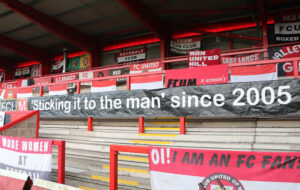Nice of GCHQ to add me to their Christmas card list this year – an honour for any journalist to hear from the brave boys and girls toiling away at the nation’s hearing aid, as I’m sure everyone on the list would agree. It came just a few days after The Guardian’s veteran former security correspondent Richard Norton-Taylor appealed via The Meteor for help in investigating what the intelligence services are hiding with respect to the Arena bombing [follow the link] “Of all the mistakes and intelligence failings behind the deadly terrorist attacks over the last few years the one where the agencies have most to hide is the Manchester suicide bombing,” he wrote, promoting a crowdfunder on behalf of security website Declassified UK. “We need to know why MI5 and MI6 dropped their guard and appear to have placed power struggles in Libya and the UK’s commercial interests there above those of the safety of British citizens,” Twenty-two people were killed when terrorist Salman Abedi blew himself up at the Manchester concert hall in 2017.
Having investigated the so-called ‘one party state’ in Manchester this year, including concerns that the security services tinkered in the recent election for council leader, for a piece which ultimately never appeared, a journalist in my position might feel jittery to have been summarily added to the mailshot. (“Where did you get my email address?” you’re minded to ask) But then one can easily become absorbed in one’s own world. It won’t have escaped readers’ attentions, though, that as of a couple of years ago the listening service has appeared to have its tanks parked on the council’s lawn, literally facing town hall across Albert Square in their new offices at Heron House. It’s natural to wonder, then – and too few people appear to be wondering it at present – to what extent has Manchester’s governance become entwined with the prerogatives of the intelligence services? 
Almost twenty years ago during the Iraq War era, when City Life was a standalone listings mag with a political edge, still owned by Norton-Taylor’s former employers at Guardian Media Group, it appeared to be infiltrated by the security services with chaotic consequences. If the security services have let down the people of Manchester then we can only hope that experienced hands at Declassified UK are as good as their reputations, independent of their sources and beholden to no hidden agendas. Their credentials, of course, are impeccable. This city is a much-changed place. That nexus between politics, property, the media and the culture industry is riven with undeclared interests. These days, with increasing frequency, you can look out at the world around you and perceive the unaccountable, murky shadows of the state.
England Made Me
Interesting to see Gwendoline Riley in the end-of-year books roundups. Had she been grown in a Porton Down petri dish as a sourpuss writer-bot the novelist may have prompted head-scratching in the mad scientist who dropped her into the culture. Her work does indeed bear passing resemblances to the notional greatest-writer-of-her-generation she seems intended to be, but with unintended glitches: almost peerless at generating sentences she strains very hard at the task of stringing them into novels worthy of them. This year’s ungrateful daughterly dispatch, My Phantoms, looks like her best attempt yet to summon the alchemy required to turn verbatim reportage into plausible literary fiction without letting daylight in on her meticulous tableside magic.
The autobiographical ‘roman a clef’ is a popular literary form these days, of course. The same roman a  clef written six times with variations is new and unusual territory, not least for a writer who appears to aspire to rub shoulders with ‘the Russians’. Monstering her own mother in the bid for immortality appears a chilling move for a gifted writer lacking in creative imagination, but that seems to be the Faustian pact for my old friend. Her Manchester credentials were established with the acclaimed first novel, Cold Water, published at the tender age ot twenty-three; there is a return in the new one, which has the glimmer of a rewrite of the last two with an eye on the Women’s Prize for Fiction, one suspects. In a world where true literary fiction scarcely exists anymore, having been replaced by the middlebrow and popular literature in translation (as one publisher put it to me) Riley is a rare exception. Reputational garlands and minuscule sales; the gestures of greatness and the fingerprints of fakery…it will be fascinating to see if judges respond to My Phantoms next year.
clef written six times with variations is new and unusual territory, not least for a writer who appears to aspire to rub shoulders with ‘the Russians’. Monstering her own mother in the bid for immortality appears a chilling move for a gifted writer lacking in creative imagination, but that seems to be the Faustian pact for my old friend. Her Manchester credentials were established with the acclaimed first novel, Cold Water, published at the tender age ot twenty-three; there is a return in the new one, which has the glimmer of a rewrite of the last two with an eye on the Women’s Prize for Fiction, one suspects. In a world where true literary fiction scarcely exists anymore, having been replaced by the middlebrow and popular literature in translation (as one publisher put it to me) Riley is a rare exception. Reputational garlands and minuscule sales; the gestures of greatness and the fingerprints of fakery…it will be fascinating to see if judges respond to My Phantoms next year.
Fight the power
Since last we checked in with them results have picked up for fan-owned FC United. Three wins from three have seen the Rebels climb to eighth place in the Northern Premier League Premier division, with a belting win at leaders Buxton on Saturday. “We’ve managed to get a more stable team together” board chair Adrian Seddon tells me. “There’s a good spirit at the moment. I think coming from such a long layoff to playing two games a week a lot of people were in the same boat…now we’ve gone one game a week we’re winning.” On the playing side the only blot on the horizon is the potential for covid disruption.
Off the field guards are up against the counter-revolution – not any specific counter-revolution, I’m told, just the possibility of counter-revolution (Adrian didn’t use the term ‘counter-revolution’ I’ve just tried to colour the issue in order to throw some light on it). With cash-strapped supporters trusts having being bought out in recent times – famously Wrexham, earlier this year, by Hollywood actors Ryan Reynolds and Rob McElhenney; previously Portsmouth, once the largest supporters trust in the land, whom Disney  subsidiary Tornante picked up in 2017; and nearly non-league trailblazers AFC Wimbledon, where fans fought off a proposal by chairman Mark Davis to bring in private investment after a shortfall in funding their stadium plans – it’s a serious concern for the Moston-based outfit. At the recent AGM members debated whether or not to introduce a two-tier system whereby voting rights would be accorded only after two years’ membership. “To prevent entryism, is the idea behind it. The argument against is that it could be a disincentive to join. The results of the vote aren’t in yet, we’ll have to wait and see if it passes.”
subsidiary Tornante picked up in 2017; and nearly non-league trailblazers AFC Wimbledon, where fans fought off a proposal by chairman Mark Davis to bring in private investment after a shortfall in funding their stadium plans – it’s a serious concern for the Moston-based outfit. At the recent AGM members debated whether or not to introduce a two-tier system whereby voting rights would be accorded only after two years’ membership. “To prevent entryism, is the idea behind it. The argument against is that it could be a disincentive to join. The results of the vote aren’t in yet, we’ll have to wait and see if it passes.”
.
.
.







